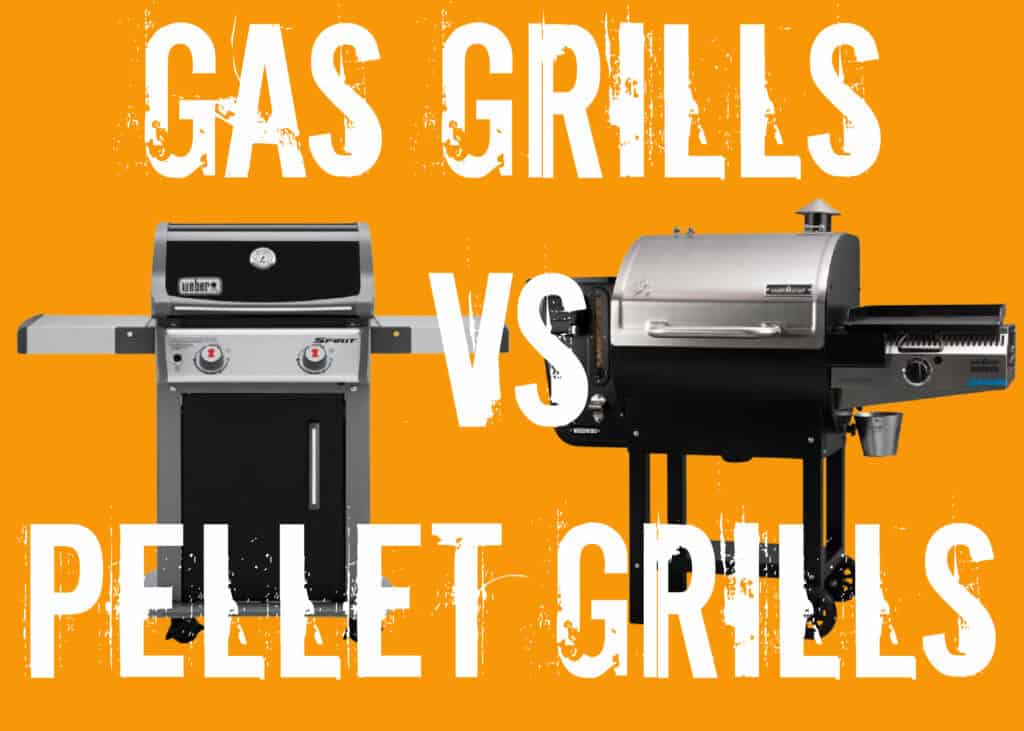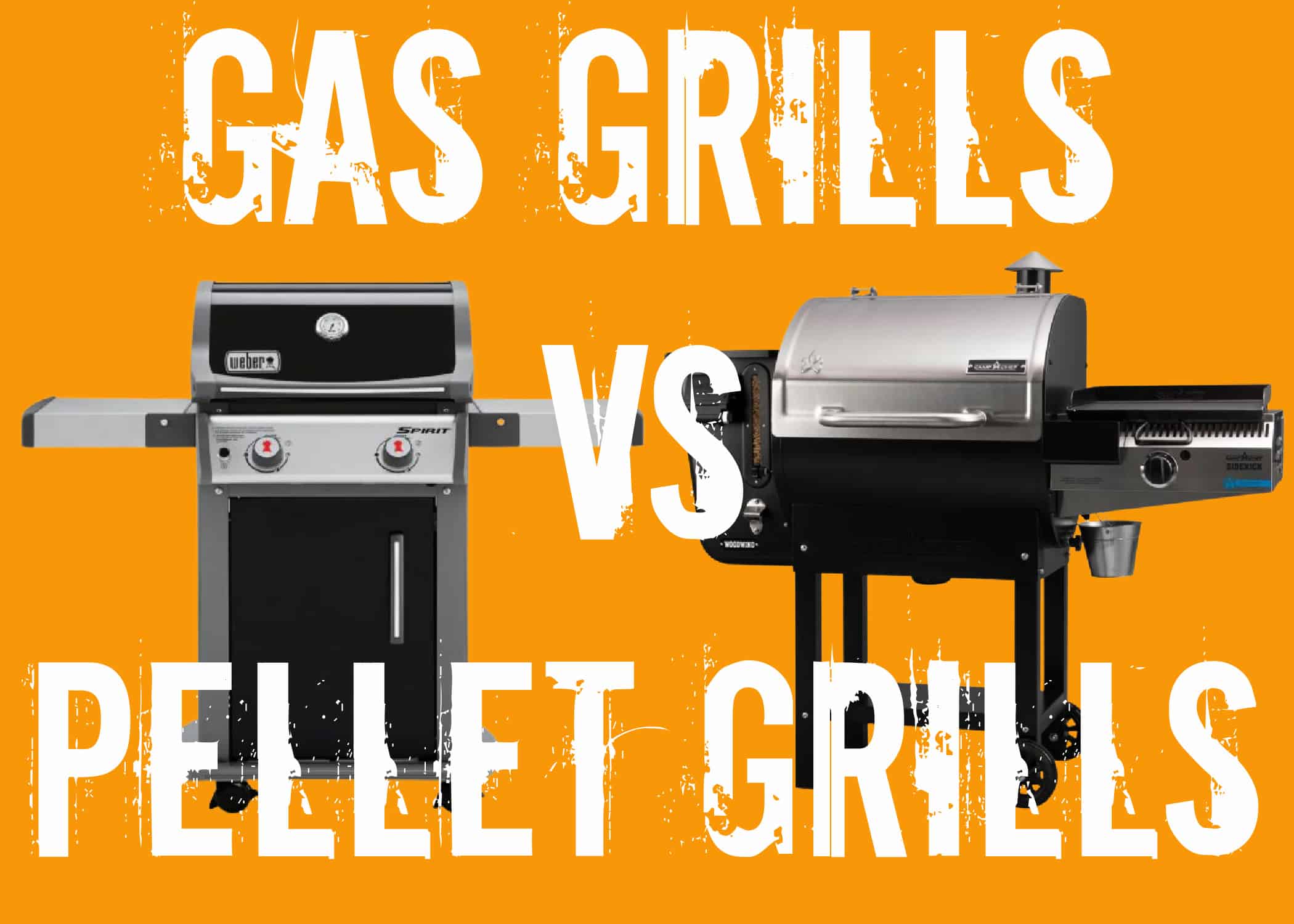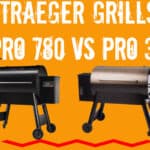Pellet grills are rapidly increasing in popularity and now you can always find either a Traeger, Pit Boss or other brand of pellet grill for sale in every Big Box store such as Home Depot and Walmart. Pellet grills now cost about the same as a quality Weber gas grill and people are starting to wonder which type is better and which they should buy.
This guide will walk you through the benefits of each type of grill and show you where one type has a clear advantage over the other.

Are Pellet Grills Better Than Gas Grills?
Propane grills and pellet burners are both great options for backyard cooking but there are distinct advantages to both types of grill. If you are into Low and Slow barbecue then a pellet grill is the obvious choice. If you want to do some serious grilling then sticking with a gas grill is the right call.
Let’s look at the positive and negatives of both types of grill.
Why Pellet Grills Are Better than Gas Grills
In most cases, pellet grills are great. The main advantages of a pellet grill over a gas grill are:
- Pellet grills have better temperature control.
- Pellet grills produce more smoke flavor.
- Pellet grills are great for Low and Slow barbecue.
- Pellet grills do not have flare ups.
- Pellet grills are still evolving.
Lets look at these advantages in more detail.
Pellet Grills Have Better Temperature Control
It is much easier to control the temperature on a pellet grill than a gas grill. You can turn a pellet grill on, set it to 225F and it will hold that temperature until you finally turn it off. In less expensive models you can expect the temperature to fluctuate by 15 degrees in either direction. In more expensive models with advanced control systems the temperature swing is in the 5 degree range.
The ability to precisely control temperatures makes a pellet grill a much more versatile cooker than a gas grill. Some people love using their pellet grills like an oven to bake casseroles or bread.
You Get More Smoke Flavor From a Pellet Grill
Because pellet grills operate by burning wood pellets they will naturally create more natural smoke flavor than a grill that burns propane. A nice benefit of using pellets is that you can change the flavor profile of the smoke to match your meats. For example, you can burn pellets made from hickory for briskets and then switch out to pellets made from apple for ribs.
A common complaint from people who switch to a pellet grill after using an offset smoker like the Oklahoma Joe’s Highland is that they do not get as much smoke as their stick burner. While it is true that a pellet grill will not produce the same flavor profile as an offset smoker it is still a much stronger flavor than you will ever get with a gas grill.
Pellet Grills Are Great for Low and Slow Barbecue
Because it is so easy to set a desired temperature and you have full control over the smoke flavor profile, pellet grills are cooking Low and Slow barbecue. Pellet grills were initially designed to make smoking briskets, butts and ribs easy.
One of the biggest barriers to making great barbecue with a traditional smoker is figuring out how to manage the fire. If the fire burns too hot then your meat will be tough. If the fire smolders and doesn’t burn clean then the meat will taste bitter from excessive smoke. When you use a pellet smoker the biggest obstacle, fire management, is taken care of.
Because of their ease of use, pellet grills are one of the best smokers for beginners.
Pellet Grills Do Not Have Flare Ups
One of the biggest problems with grilling on a gas grill is dealing with flare ups. If you put a dozen hamburgers on a gas grill and walk away then you are going to have a fireball on your hands in about five minutes.
Pellet grills are designed with a large solid grease tray that sits between the fire box and the cooking grate. The tray slopes and drains the grease away from the fire pot and into a grease catch external to the body of the grill. It is just about impossible for there to be a flare-up while you are cooking on a pellet grill.
There are some exceptions to this rule, especially on Pit Boss grills that let you do direct flame grilling, but in general you just don’t get flare ups on a pellet grill.
Evolving Technology
At their core, pellet grills are electronic devices and the technology for controlling them is rapidly evolving. You can now buy pellet grills with WiFi enabled controllers that allow you to control them remotely from your phone. Some of the grills come with integrated meat probes and allow you to set the grill into a “warming mode” once a target internal temperature is met.
If you are into technology and gadgets then there are a lot more fun options when it comes to pellet grills compared to gas.
Why a Gas Grill Better than a Pellet Grill
While I love my pellet grills there are valid reasons to buy a gas grill instead.
- Gas grills are more reliable.
- Gas grills are better for high heat grilling.
- Gas grills are more fun.
- Gas grills work when the power is out.
- Gas grills are better in the rain.
Lets look at these advantages in more detail.
Gas Grills are More Reliable
There are fewer moving parts on a gas grill than a pellet grill which makes them inherently more reliable. On a pellet grill you have an electronic control panel, a motor that drives an auger and a fan that blows combustion air into the fire pot. Pellet grills can blow internal fuses, have auger jams and broken fan blades.
The increased reliability of gas grills over pellet grills can be seen by looking at the grill offerings of Weber. Weber warranties their Genesis gas grills for 10 years on all components compared to 3-5 years for their Smokefire pellet grills.
An unexpected reliability advantage for gas grills is the stability of fuel sources.
I always keep an extra tank of propane on my deck in case I run out of fuel mid cook. That tank can sit there for a year and I know that it will be fine to use. This is not the case for wood pellets. Over time wood pellets absorb moisture from the air which makes them swell, decompress and turn to sawdust. Keeping a backup supply of pellets on hand requires careful planning and making sure you rotate through your supply.
Gas Grills Are Better for Grilling
With very few exceptions, gas grills are much better at high temperature grilling than a pellet grill.
A decent gas grill will easily heat up into the 550-600F range which is perfect for searing steaks. In contrast, most pellet grills struggle to hit the 450-500F range. A gas grill will also heat up more quickly than a pellet grill. Fast heat up times are not important if you are going to be smoking ribs for 4-6 hours but are meaningful if you just want to grill a couple pieces of salmon.
If you primarily want to use your grill for Hot and Fast cooking for burgers, wings chicken breasts and steaks then a gas grill is going to be a better choice.
Gas Grills Are More Fun to Use
One of the benefits of a pellet grill is that you never have to deal with flare ups. On the flip side, I love playing with fire and battling flare ups on a gas grill can be fun.
When I fire up a big Weber Genesis I have fun playing Grill Master and watching a pile of ribeye steaks sear off. When the grease starts dripping and the flames are flaring you get to do the dance of managing which steak goes where while waiting for the grease to burn off.
Using a pellet grill is a pretty passive “set it and forget it” activity while using a gas grill is a much more interactive process.
No Electricity Needed
A pellet grill gets all of its heat and smoke from burning wood pellets but it still needs to be plugged into an electrical source to power the electronics, auger motor and fan. There are several reasons I dislike having to plug in a pellet grill.
- I have to run an orange extension cord across my deck to power my pellet grills and it looks ugly.
- I also live on the Gulf Coast where tropical storms knock our power out several times each season, often for a few days.
- The need for electricity makes it a hassle to take a pellet grill to a tailgate party or on a camping trip.
The beauty of a gas grill is that you can fire it up anytime and anywhere you want.
You Can Cook on a Gas Grill in The Rain
You can use a pellet grill in the rain but the practice is not recommended. There are several reasons why using a pellet grill in the rain is a bad idea that I detail in this article, Can You Use a Traeger Grill in the Rain?
Issues involves mixing electricity and water, swelling of the wood pellets and longevity of the grill.
In contrast, as long as you don’t mind getting wet, you can cook on a gas grill all day long if it is raining.
Which is Right for You?
There is no clear cut answer as to which type of grill is better as it depends on how you intend to use them.
If you want a grill that will make it easy to make amazing barbecue like pulled pork and smoked baby back ribs then, without question, you want to buy a pellet grill.
If you want to have fun chasing the flames while searing off a couple of monster ribeye steaks then a gas grill is going to be the way to go.



